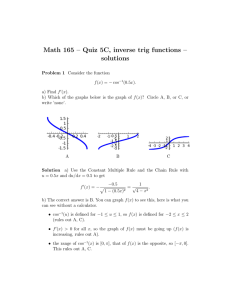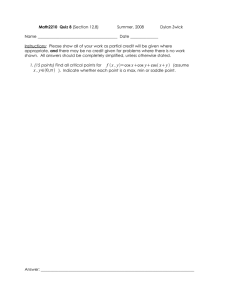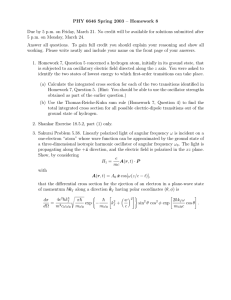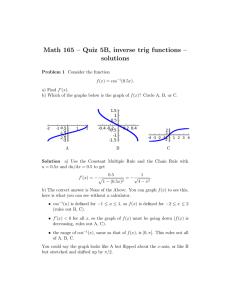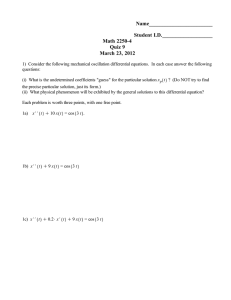Announcements 10/31/11 Prayer Happy Halloween! Test going on…
advertisement
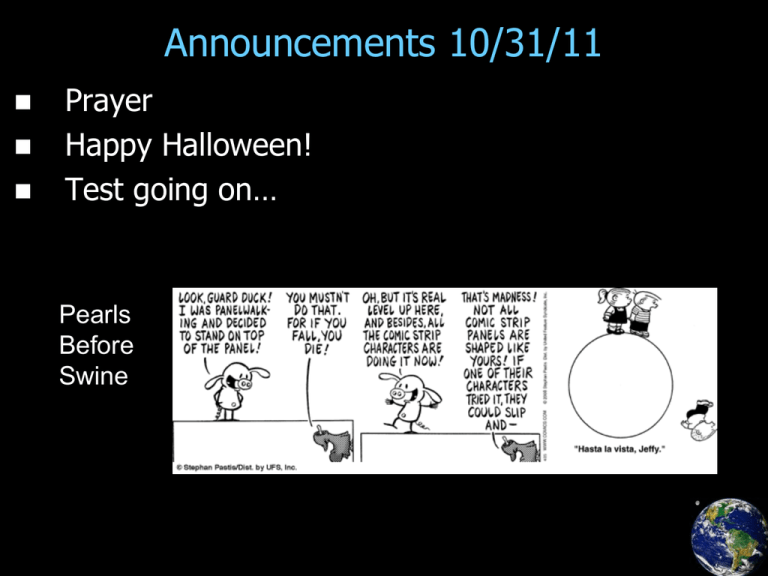
Announcements 10/31/11 Prayer Happy Halloween! Test going on… Pearls Before Swine Horizontally Polarized Light Credit: the next few slides are from Dr. Durfee Vertically Polarized Light Diagonally Polarized Light Circularly Polarized Light Elliptically Polarized Light Unpolarized Light Thought question What type of polarization is displayed in the animation? http://stokes.byu.edu/emwave_flash.html a. Horizontally polarized b. Vertically polarized c. Diagonally polarized d. Other polarized e. Non-polarized Circularly Polarized, pictures Pictures from Wikipedia Polarizers Crystals Lines Polaroid of wires film Polaroid Film Crystals www.thorlabs.com Thought question If you send horizontal linearly polarized light through a (perfect) vertical polarizer, how much of the light intensity will get through? a. 0-20% b. 20-40% c. 40-60% d. 60-80% e. 80-100% Thought question If you send horizontal linearly polarized light at 45 through a perfect vertical polarizer, how much of the light intensity will get through? a. 0-20% b. 20-40% c. 40-60% d. 60-80% e. 80-100% Thought question If you send circularly polarized light through a perfect vertical polarizer, how much of the light intensity will get through? a. 0-20% b. 20-40% c. 40-60% d. 60-80% e. 80-100% Thought question (Like HW 27-2) If you send horizontal linearly polarized light through a vertical polarizer, no light gets through because there is no component of the electric field in the light wave that is oscillating vertically. If you insert a diagonal polarizer at 45 between the two, how much of the light intensity will now get through the final polarizer? a. 0-20% b. 20-40% c. 40-60% d. 60-80% e. 80-100% Demos Polarization configurations Reading Quiz What do we call the angle at which light, reflected off of a (non-conducting) surface, is completely polarized? a. Brewster’s Angle b. Euler’s Angle c. Maxwell’s Angle d. Snell’s Angle e. Sorenson’s Angle Remember these? (Fresnel Coefficients) If near perpendicular (1-D problem) v2 v1 n1 n2 r v1 v2 n1 n2 When/what is phase shift? R r 2v2 2n1 t v1 v2 n1 n2 2 T 1 r 2 For arbitrary angle (you don’t need to know for this class) n1 cos1 n2 cos2 rs polar . n1 cos1 n2 cos2 ts polar . n1 cos2 n2 cos1 rp polar. n1 cos2 n2 cos1 2n1 cos1 t p polar. n1 cos2 n2 cos1 2n1 cos1 n1 cos1 n2 cos2 What is s-polar? What is p-polar? Plots for air (n=1) to glass (n=1.5) s-polarization p-polarization field amplitudes vs field amplitudes vs 1.0 t 0.5 t 0.8 0.6 20 40 60 80 r 0.5 0.4 r 0.2 20 1.0 40 60 80 0.2 intensities vs Do you always intensities get a 180 phase shift1.0upon reflection?0.8 1.0 T 0.8 0.6 0.6 0.4 0.4 R 0.2 20 40 vs T R 0.2 60 80 Brewster’s angle! 20 40 60 80 Fresnel Coefficients, cont. If near perpendicular (1-D problem) v2 v1 n1 n2 r v1 v2 n1 n2 R r 2v2 2n1 t v1 v2 n1 n2 2 T 1 r 2 For arbitrary angle (you don’t need to know for this class) n1 cos1 n2 cos2 rs polar . n1 cos1 n2 cos2 ts polar . 2n1 cos1 n1 cos1 n2 cos2 n1 cos2 n2 cos1 2n1 cos1 rp polar. t p polar. = 0, apply Snell’s Law… n1 cos2 n2 cos1 Set numerator n 1 cos 2 n2 cos1 lots of algebra/trig… tan1 = n2/n1 Thought question If you send an unpolarized beam at a piece of glass at Brewster’s angle, what happens? a. The reflected beam is partially polarized b. The reflected beam is completely polarized c. The transmitted beam is partially polarized d. The transmitted beam is completely polarized e. More than one of the above “Brewster windows” p-polarization If you send p-polarized light towards a piece of glass at Brewster’s angle, how much gets transmitted? 1.0 t 0.8 0.6 0.4 r 0.2 20 40 60 80 0.2 1.0 T 0.8 0.6 0.4 R 0.2 20 40 60 80 Thought question In polarized sunglasses, some of the glare from the sun is eliminated when the sun is directly in front (and above) you. Should the polarizing material be aligned to allow vertical or horizontal electric field through? a. vertical b. horizontal Demo Flashlight reflecting off of glass
